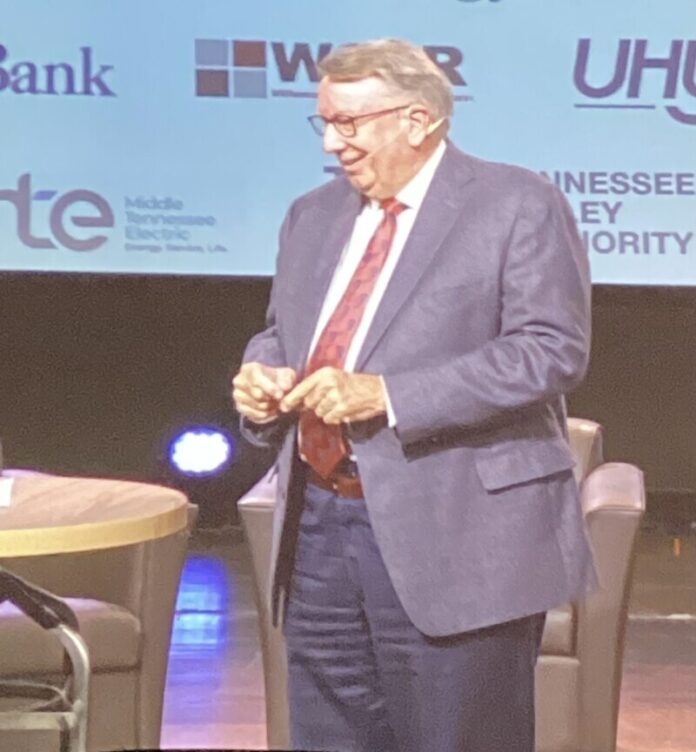At Franklin Tomorrow’s most recent Breakfast with the Mayors, David Lipscomb University’s former president Randy Lowry discussed the need for civility as the necessary quality in the next generation of conflict resolution on all fronts – local, national and international.
Lowry began his talk by referring to the Camp David Accords, when President Jimmy Carter brought together Egyptian President Anwar Sadat and Israeli Prime Minister Menachem Begin in September 1978 to work on establishing a peace treaty between the two long-warring nations. Although they were bitter enemies, after 13 days of negotiation, the two men were able to find a sense of peace that fulfilled the most basic need of both countries. The peace has been maintained for the 45 years since.
After a contentious election in Franklin for Mayor, both newly re-elected Franklin Mayor Ken Moore and County Mayor Rogers Anderson are interested in working with the community to find a renewed sense of peace. Lowry is one of the people they turn to for ideas on how to do just that.
“We want people who can come together so that in spite of their differences can find some way to work through those and accomplish a sense of peace,” said Lowry, “and through that peace, because of that peace, life is so much better.”
Lowry noted that there were two observations that he has made that have made peace difficult. First, he states that democracy is “really, really messy.” Second, “unity” does not mean “uniformity.”
“We have adopted a sense of how a community should come together with some underlying principles [that include] a respect for people’s rights, freedom of expression, and freedom of the press,” explained Lowry. “[W]e as a people say…that’s the kind of government we’d like to have. Yet, it’s really difficult. And at times, really messy.”
He referred to a quote by founding father John Adams, about the “deep jealousies, ill-natured observations and harsh incrimination that take the place of reason and argument.” We are still dealing with these issues today because we have developed a process of finding an issue then taking up sides and defending the side we take with the ferocity of a dragon. There is little room for compromise, let alone understanding the real drivers of the conflict.
According to Lowry, to find a way to come together and solve the community’s issues does not mean that everyone needs to be uniform — having the same background, beliefs, experiences, values. Lowry believes it is about finding unity. However, we are a nation that loves conflict. Our entertainment choices are full of it. But, Lowry notes that what is fine for entertainment is not fine to build a society united to solve their problems and conflicts. Yet, we are driven to find solutions to these problems.
He suggests three concepts that he feels are the way to ground the process of coming together as a community:
- Leading with respect
- Having a firm center with soft edges
- Focusing on interests, not positions
During his tenure as president of David Lipscomb University, Lowry began with a regard for the rights and beliefs of others, respecting differences and looking for common ground. Finding common ground is the base upon which he built his administration, as the college is currently 34% ethnic minority. Many of these minority students are non-Christians.
Next, he believes in standing firmly for one’s beliefs, but practicing them with graciousness and humility. He looks to the practices of one of the nation’s leading civil rights attorneys, Fred D. Gray. Gray’s life’s work was breaking barriers, but he did so with the graciousness and humility upon which Lowry believes.
Lastly, Lowry discussed listening to find a solution to a problem that meets the interests of both sides. He notes that fighting a fight and standing our ground in a trial feeds our egos, but it does not solve problems. Interest-based collaboration settles issues and solves problems. It was when Carter came to understand what was the underlying driver of the Egypt-Israeli conflict that he was able to help Sadat and Begin find accord.
“When I meet your interests,” added Lowry, “you are going to be more interested in meeting mine. But I have to get there first. I have to listen. I have to understand.”
He ended the talk by asking the audience if we can lead with deep respect for each other, nurture firm centers and soft edges, seek interest-based collaboration as opposed to positional-based fights, and finally, can we in this community be thinking not just of ourselves, but of our children and our grandchildren as well.
“Peace is not the absence of conflict,” he ended, “peace is our [working] to deal with it, effectively and responsibly.”
Please join our FREE Newsletter


















